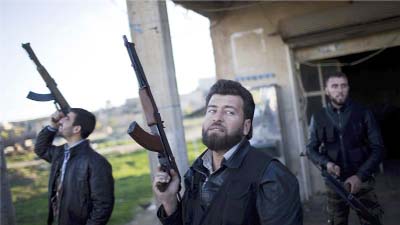
Al Jazeera News :Aleppo, Syria – In 2012, Mohammad Matoh joined the Free Syrian Army. A year later he deserted finding work at a fast-food restaurant in Aleppo.”Five members of our family were with the FSA. Now two are in Turkey after getting injured and two are still with the FSA,” he told Al Jazeera. Matoh, 27, recalls other friends leaving as well. One of them, he said, “was forced to leave as a result of the inadequate salary, which was at best 18,000 Syrian pounds [$95] a month”. Matoh himself claims his salary started at only 8,000 Syrian pounds ($36) a month, before rising slightly.Ahmad Jalal, 21, a field commander in the FSA, admitted that the salaries “can be as low as $50 a month, and sometimes salaries are not paid due to [lack of] support”.The FSA, once viewed by the international community as a viable alternative to the rule of the Syrian President Bashar al-Assad, has seen its power wane dramatically this year amid widespread desertions.Nowhere is this more apparent than in Aleppo, Syria’s largest city where many FSA soldiers are leaving the group, citing inadequate pay, family obligations and poor conditions.In the past month, Russia’s bombing campaign against Syrian rebel groups and the FSA’s rejection of Russian invitations to participate in negotiations have further weakened it, raising questions about the group’s place in any future settlement.On Wednesday, reports of a new Russian ‘peace plan’ were revealed. The eight-point proposal cites a constitutional reform process lasting 18 months that would be followed by presidential elections. According to the plan, ‘certain Syrian opposition groups’ should participate in the Vienna talks, expected to take place next Saturday. Formed in August 2011 at the start of the Syrian civil war, the FSA comprises mainly defectors from the Syrian military. The group is viewed as moderate compared with the Islamist rebel groups that later emerged.The FSA began suffering battlefield setbacks as early as 2013, including some to Islamist rebel groups in northern Syria. This prompted some members of the US House Intelligence Committee and the Obama administration to lose faith in the FSA.A new US-backed alliance of rebel groups, called the Democratic Forces of Syria, was launched this year and only includes groups focused on fighting the Islamic State of Iraq and the Levant (ISIL), which is waging war against both the regime and several rebel groups throughout Syria. The new Democratic Forces of Syria alliance does not include the FSA, which is concentrating on fighting the Assad regime.But observers say that US support has not yet waned.”I don’t think that the US has moved away for groups it has previously supported,” said Ammar Waqqaf, a member of the British Syrian Society and a frequent media commentator on Syria.However, its exclusion from the Democratic Forces of Syria may lead to further isolation for the FSA. Waqqaf noted that “the US badly needs someone on the ground whom it can support and could mount some sort of a serious challenge to ISIL, hence the formation of new groups, including the Democratic ones”.

